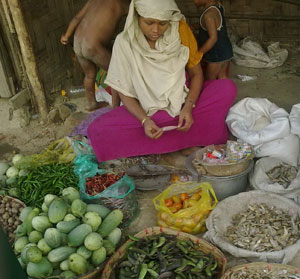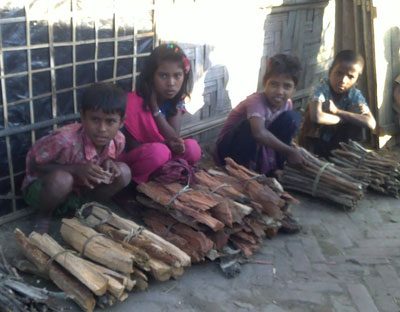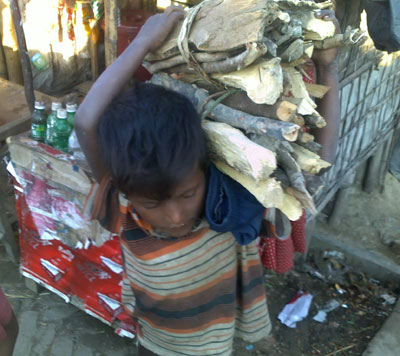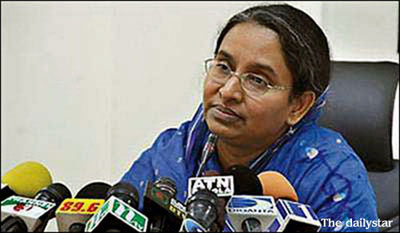Nur Fatema, a twenty-six year-old mother of 4, left her home in Arakan State and fled to Bangladesh along with her disabled husband eight years ago, because of brutal treatment by the Burmese Military...
Nur Fatema, a twenty-six year-old mother of 4, left her home in Arakan State and fled to Bangladesh along with her disabled husband eight years ago, because of brutal treatment by the Burmese Military.
 “I along with my family members came to Bangladesh because various human rights abuses, including religious persecution as well as forced labor, restrictions on movement, education and marriage, land confiscation, unfair taxation, extortion and arbitrary arrest by the military junta,” she told Kaladan News in an interview.
“I along with my family members came to Bangladesh because various human rights abuses, including religious persecution as well as forced labor, restrictions on movement, education and marriage, land confiscation, unfair taxation, extortion and arbitrary arrest by the military junta,” she told Kaladan News in an interview.
In January 2003, she crossed the Burma-Bangladesh border at night by row boat illegally from Shapuri Dip, under the Teknaf police station.
After her arrival, she lived in a rented house in Teknaf for nearly six months, until Bangladeshi authorities started arresting Rohingya people living in the area illegally during Operation Clean Heart, on October 17, 2002.
The Township officer told her to move the family to Dum Dum Mea unofficial camp after she was harassed by local residents.
They stayed at Dum Dum Meah camp without refugee status for nearly five years. They struggled to find food and survive in unhealthy living conditions on the banks of the Naff River. Flooding threatened to wash away their home during the time of the full moon and rainy season.
Many unregistered refugees at Dum Dum Meah suffered from diarrhea and pneumonia. Many died as a result.
Therefore, the Bangladeshi authorities moved the refugees to Leda Tal in June 2008.
 Today, she is the sole provider for her four children and her disabled husband, who cannot walk or earn an income.
Today, she is the sole provider for her four children and her disabled husband, who cannot walk or earn an income.
They all crowd into a very small hut, struggling to survive without support from any aid agency because the family is still not recognized officially as refugees by the UNHCR and Bangladeshi authorities.
She goes to Teknaf market every day and buys potatoes, dried fish, onions, beans, chili and tomatoes. She sells them in Leda camp, but struggles to feed her family on the 40 to 50 taka profit from her business, which is about 50 cents.
She said she is very sad she can’t send her son to school because the Bangladeshi authorities don’t provide school in Leda unregistered refugee camp.
“My child’s life is going to continue to be difficult with no education,” she said.
“We are still not recognized as legal refugees. How long can we live this way?”
So, Fatema calls for urgent intervention by the International Community, UNHCR and Bangladeshi authorities to provide official recognition as legal refugees, education, better living conditions, and equal rights for Rohingya people- recognizing their dignity as human beings in Arakan State, Bangladesh and wherever they live.
Like Fatema, many unregistered Rohingya refugee women and young children go to forest to collect firewood. Some go to Teknaf and purchase food stuffs to resell or make Rotee to sell in Leda camp.
Many young children have never gone to school because they are too busy struggling to survive.
 Refugees said in an interview most Rohingyas work as daily laborers and live in squalid conditions in the camp. So parents are not able to feed their children properly. The children suffer from malnutrition.
Refugees said in an interview most Rohingyas work as daily laborers and live in squalid conditions in the camp. So parents are not able to feed their children properly. The children suffer from malnutrition.
A refugee community member told Kaladan Press Network (KPN) that he has been struggling to survive at the unofficial refugee camp over ten years without legal refugee status.
First, he lived at Teknaf upazila (Tal) from 2000 to 2003. After that, the Bangladeshi authorities forcibly moved the refugees from Teknaf without giving any reason.
Later, they gathered at Dum Dum Mea of Teknaf, near the bank of the Naff River and close to the Teknaf-Cox’s Bazar highway because they had nowhere else to go.
Many Rohingya refugees died in road accidents and from disease at that time.
The EU and UNHCR said in a report during a visit to the area in April 2006:
“Between 10,000 and 14,000 members of the unofficial Rohingya population live in the makeshift Dum Dum Meah camp, approximately six kilometers north of Teknaf. The camp is situated between the bank of the Naff River and a highway. The river floods regularly, making refugee shelters vulnerable to being washed away and the highway has claimed a number of refugee children’s lives. Refugees leaving the camp to look for firewood and other provisions are frequently exposed to abuse and harassment from the local Bangladeshi community.”
The UN also said both the UNHCR and delegates from the E.U. who visited Dum Dum Meah makeshift camp condemned the Bangladeshi government for the conditions endured by the refugees sheltering there. The United Nations declared it a state of humanitarian emergency, while the E.U. expressed concern over the “miserable” conditions experienced by Rohingya refugees outside of the official camps and asked the Bangladeshi authorities to “rehabilitate undocumented refugees from Burma. In April 2006, the Bangladeshi authorities permitted Médecins Sans Frontières – Holland (MSF) to document the Rohingya refugees in Dum Dum Meah camp and to provide them with some humanitarian support including latrines, blankets, and etc. An MSF clinic was established at the site of the makeshift camp soon after.
 When the situation became worse day by day, all the refugees were moved again to Leda (Tal) from Dum Dum Mea makeshift camp by Bangladeshi government in June, 2008.
When the situation became worse day by day, all the refugees were moved again to Leda (Tal) from Dum Dum Mea makeshift camp by Bangladeshi government in June, 2008.
Now, over 10,000 Rohingya refugees have been living in Leda camp from 2008 to now in even worse conditions.
A refugee teacher from Leda camp said, “The Rohingya refugees of Leda camp frequently go to Teknaf as labourers and rickshaw pullers because they don’t get support from any source. They must do this to feed their children. If they don’t find work outside the camp, they have to starve with their family members.”
He also said that the camp situation of Leda Tal is awful because refugees leaving the camp are harassed, beaten and robbed by locals when they return to the camp in the evening with food for their family members.
Over 80 Rohingyas from Leda camp were arrested and sent to Cox’s Bazar jail by Bangladeshi authorities four months ago, while on their way to find work to feed their families. They receive no food ration as illegal/unofficial refugees.
Some were released, but more than 50 unregistered refugees have been languishing in Cox’s Bazar jail because their family members are unable to pay money for their release, according to a prisoner.
Muslim Aid provides basic treatment and sanitation in the Leda camp but they don’t provide food, sources said
An elder from Leda camp said many unregistered refugees are afraid the Bangladeshi authority is planning to repatriate them.
The Bangladeshi government has already had discussions with the Burmese military regime about repatriating the unregistered refugees to Burma. It is not confirmed yet when they will start the repatriation.
Foreign Minister Dipu Moni said in a January 25, 2011 press conference she discussed various bilateral issues, including hydropower, border trade zones with the military regime and repatriation of both registered and undocumented Myanmar citizens (Rohingya), when she visited Burma last month.
The Foreign Minister also said the regime agreed to repatriate its refugees as early as possible.
Twenty-eight thousand registered refugees from Burma are living in Bangladesh, while 300,000 to 500,000 unregistered may live there.
“We should go back to our motherland if we get full equal rights and citizenship like other ethnic groups,” a refugee leader said.
“We want to stay in Bangladesh or elsewhere until democracy is established in Burma, so we can obtain citizenship which is a human right the regime denies Rohingya citizens.
“How can we go back to Burma again when nothing changed after the 2010 elections? It is the same junta, same rules, like old wine in new bottles,” he said.



